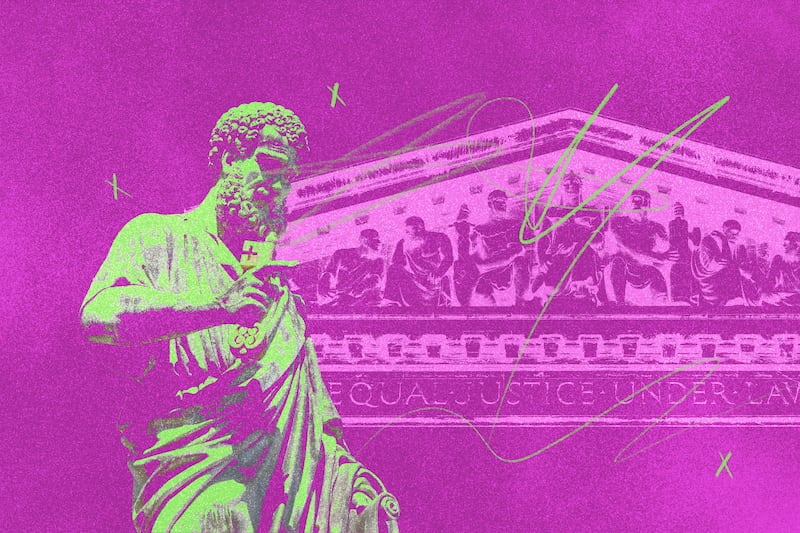This article was first published in the State of Faith newsletter. Sign up to receive the newsletter in your inbox each Monday night.
These days, I’m feeling a bit like I just exited a Tilt-A-Whirl ride and have yet to regain my grip on reality. My head is spinning as I try to work out the long-term significance of the Supreme Court’s recently concluded term.
To aid my quest to feel grounded again, I typed up this guide to the court’s faith-related rulings. Give it a read and let me know if there are stories tied to these decisions that you’d still like to see!
Cases that involved a religious freedom claim
Ramirez v. Collier: The Supreme Court ruled 8-1 in favor of a death row inmate in Texas who was fighting for the right to touch and hear prayers from his spiritual adviser in the execution chamber as he was put to death. The majority opinion said Texas officials could do more to meet religious accommodation requests without jeopardizing the safety and security of everyone involved in the execution process.
Shurtleff v. City of Boston: There were no dissents in this battle over access to a public flagpole in Boston, but not all justices joined the majority opinion. They did all agree that city officials were wrong to block a Christian group from flying its flag over city hall, but differed on whether the court needed to do more to clear up confusion related to free speech and religious freedom protections.
Carson v. Makin: In a 6-3 decision, the court said Maine officials needed to allow more faith-based private schools to receive public education funds. Justices in the majority said the ruling should have been unsurprising given other recent cases involving religious schools, while the dissenters argued that Carson v. Makin represented a major breach in the wall between church and state.
Kennedy v. Bremerton: It was conservatives versus liberals in the term’s final religion ruling. The 6-3 decision said that a high school football coach can pray alone at the 50-yard line after games during the time when other coaches are checking their phones and greeting friends. Teachers do not forfeit their religious freedom rights when they walk through the schoolyard gates, the justices said.
Other faith-related cases
FBI v. Fazaga: The Supreme Court unanimously ruled against a group of Muslims challenging FBI surveillance practices, deciding that the lower courts had misapplied a federal law governing the use of evidence collected through surveillance operations. The Muslim men involved in the case have vowed to continue fighting, and the majority opinion implied the justices were open to revisiting the case in the future.
Dobbs v. Jackson Women’s Health Organization: In this major abortion rights case, six justices voted to uphold Mississippi’s 15-week abortion ban and five voted to overturn Roe v. Wade. Now, the authority to set abortion policy rests with individual states. As more conservative faith groups cheered the court’s decision, more liberal ones prepared to file religious freedom lawsuits challenging abortion bans.
Fresh off the press
Do abortion bans violate the establishment clause?
Pope Francis and Elon Musk just met up. No, really
The Supreme Court came together on religion this term. Then, it fell apart
Term of the week: Eid al-Adha
Eid al-Adha is the Muslim holiday that commemorates the story of Ibrahim and Ismail (known by Christians as Abraham and Isaac.) It begins on the third day of hajj, the annual pilgrimage to Mecca that all Muslims are supposed to participate in at least once.
To celebrate the holiday, which began on Friday night in the United States and spans four days, Muslims go to their mosque to worship, gather with family and friends for large meals and hand out toys and money to children. My colleague, Mya Jaradat, wrote an explainer on the holiday for the Deseret News.
What I’m reading...
In response to the Supreme Court’s recent faith-related rulings, a self-described “recovering angry atheist” wrote for Religion News Service on why it’s wrong to label the justices as “pro-religion.” That term oversimplifies the diverse world of faith, making it seem as if all religious believers hold the same views on contentious issues, Allison K. Ralph said.
Members of Mariupol Church of Christ in Ukraine sheltered in their church building during the worst of Russia’s attack on their city. The Christian Chronicle met with many of them in Poland to discuss those harrowing days and what lies ahead.
Texas officials are yet again embroiled in legal conflict over their approach to religious accommodation requests from death row inmates. A District Court judge has determined that an execution planned for next week cannot move forward unless the prison system grants the inmate’s request to hold hands with his spiritual adviser as he dies.
Disney is facing a religious freedom lawsuit over masking and vaccination policies that are no longer in place, according to The Associated Press.
Odds and ends
Thursday at 3 p.m. eastern, I’m taking part in a virtual panel on religious freedom and the Supreme Court hosted by the Aspen Institute’s Religion & Society Program. The event is free to attend. Use this link to register.
Don’t miss this powerful column on what a journalist learned about journalism when she stopped reading the news.


